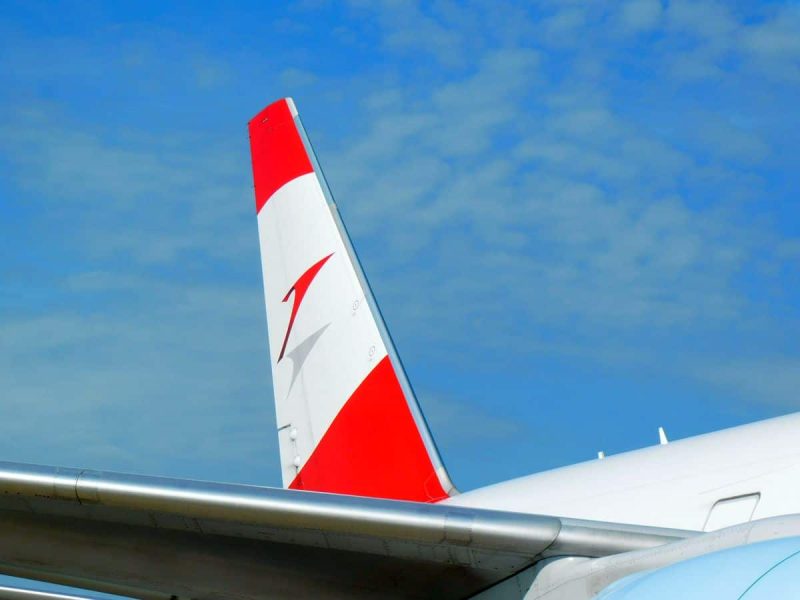A few days ago, Austrian Airlines announced that the capacity of the Boeing 777-200 fleet will be increased. In the future, there will be 330 seats, offering narrow seat spacing in Economy Class. Only United Airlines on domestic flights and British Airways in the leisure configuration are currently operating with comparably high capacity.
From May 1, 2023 the first B777-200 with a converted cabin will initially be used on five routes. Austrian Airlines currently has 306 seats in this aircraft type. In future there will be 32 in business class (previously 38 seats), 40 in premium economy (previously 24 seats) and 258 in economy class (previously 244 seats). With a capacity for 330 passengers, a particularly narrow seating is chosen, which is comparable to the competitors mentioned in the first paragraph.
In the new configuration, the Boeing 777-200 will be deployed to Bangkok, Chicago, Newark, Shanghai and Tokyo from May 1, 2023. With the exception of the destination in the People's Republic of China, the aim is to fly this pattern once a day. In the direction of Shanghai, the aim is to have six weekly flights, but currently only one round trip per week has been released for booking. This is primarily due to the fact that China continues to practice complicated entry and quarantine regulations. It is therefore necessary to await further developments.
Boeing 767 fleet may have no successor
It is an open secret that Austrian Airlines' long-haul fleet is getting on in years. For more than a decade there have been rumors that a decision about a possible fleet renewal could be imminent. In the end nothing has happened so far. Before the corona pandemic, Lufthansa boss Carsten Spohr repeatedly gave signals in the direction that Austrian Airlines had to “earn” new machines. In other words: long-haul routes from Vienna-Schwechat must become more profitable and only then can Austrian Airlines think about possible new machines.
Published by the Austrian Ministry of Transport BMK Aviation Strategy 2040+ Austrian Airlines and its Vienna hub play a special role. The document is tailored in many passages to the Lufthansa subsidiary, but it does not really deal with the fact that the long-haul fleet is aging. Recently, a board member said that the Boeing 767-300ER fleet could continue to be flown for a few more years. Whether there will be a successor for this type of machine at all is completely open.

These were originally delivered to Lauda Air. This also applies to some B777s. Austrian Airlines had Airbus A330 and A340 in this segment. However, these were separated and continued to fly with the former Lauda Air fleet. Over the years, this has been supplemented by one or two used aircraft. In the course of the corona pandemic, three B767-300ERs were parted with.
Compared to the AirInsight portal, company boss Annette Mann states that there could be no successor for this type of machine. She also refers to the climate goals that are being pushed by the European Union, but also by the Austrian federal government. Among other things, the manager said: "First of all, we want to know how the European Commission's Fit for 55 plan will affect our hub strategy in Vienna, where we have a rather small hub for long-haul flights. As Fit for 55 looks now, carbon offsetting rules and Sustainable Aviation Fuel (SAF) targets will make bypassing European airports more attractive for passengers. For example, the flight via Istanbul will become much cheaper. The renewal of the long-haul fleet by the end of the decade could be influenced by the outcome of the Fit for 55 plan. If Vienna becomes just a very small hub, investing in new long-haul aircraft may not be a wise decision.”
The AUA boss is thus hinting at a topic that has been causing headaches for some European airline bosses for a long time. While an anti-aviation atmosphere is being created in the European Union and feeder flights in particular are to be avoided as far as possible, massive support is being given in other parts of the world. For example in the Gulf region, but also in Saudi Arabia. The kingdom is spending billions of dollars to play a major role in aviation in the future. To put it simply: what is supposed to be saved in terms of carbon dioxide emissions in Europe should be caused again elsewhere in the world. This inevitably leads to massive distortions of competition and can, of course, also influence decisions by the Lufthansa Group as to whether or not to continue investing in Vienna.







 trail (for them it's free to use)
trail (for them it's free to use)